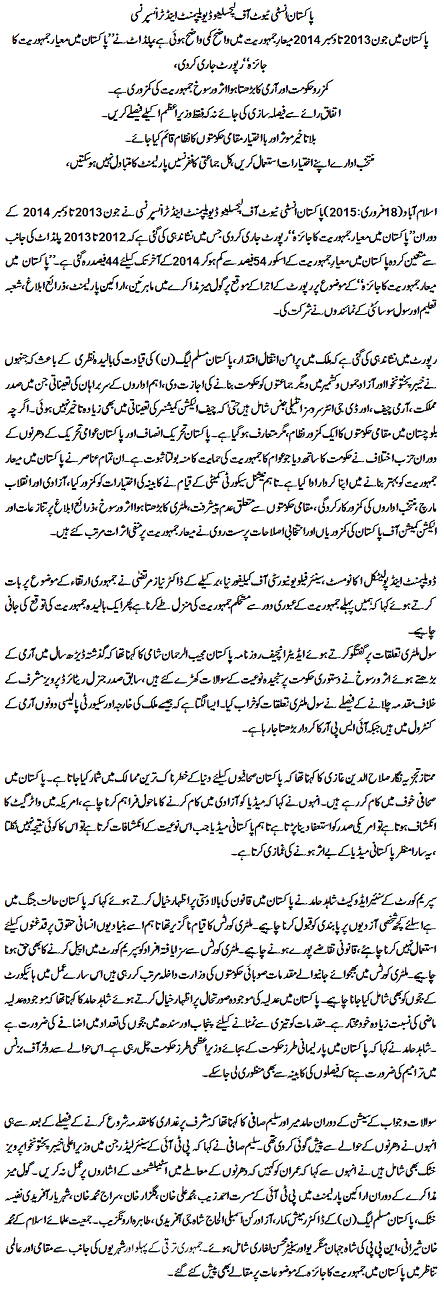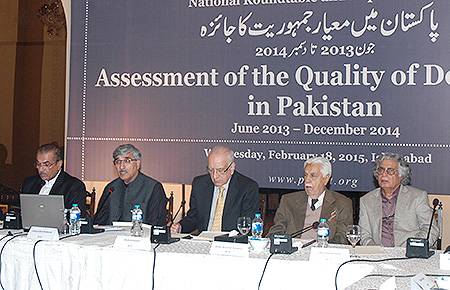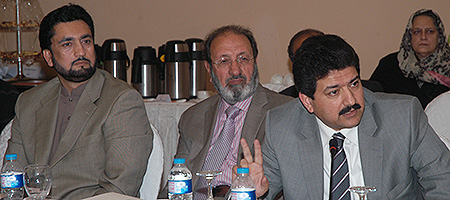|
|
| |
| EVENTS |
|
|
> Quality of Democracy Significantly Declined in 18 Months since June 2013: PILDAT Assessment of Quality of Democracy in Pakistan
|
|
|
| |
- Weak Government and Ascendancy of Military Weaknesses of Democracy.
- Introduce Collective Decision Making as opposed to Prime Ministerial Form of Government.
- Effective and Empowered Local Governments without further ado.
- Elected Institutions must Exercise Authority � APCs dilute Powers
of Parliament.
- Reform, not Ridicule Institutions such as the ECP.
- Political Parties instead of lengthened shadows of Leaders should be made into Institutions.
- Eradicating Terrorism requires Serious, Sustained and Inclusive Approach.
|
|
| |
February 18; Unveiling its Assessment of the Quality of Democracy in Pakistan for the period of June 2013 � December 2014, PILDAT and its Democracy Assessment Group have concluded that quality of democracy has declined in 18 months since the General Election of May 2013.
The score on overall quality of democracy in Pakistan stood at 54% during 2012-2013 while it declined to 44.3% at the end of 2014.
PILDAT�s Report on Assessment of the Quality of Democracy, June 2013 � December 2014 was launched at an interactive Roundtable discussion involving experts, MPs, media, academia and civil society.
|
|
| |
Factors that positively contributed to quality of democracy during the period included Smooth Transfer of Power; Maturity by the ruling PML-N
in allowing for formation of Governments in KP, Balochistan and AJK; Smooth Appointments of Heads of Institutions such as the President, Army Chief and the DG ISI, even though the Chief Election Commissioner could not be appointed without inordinate delay; holding of Local Government Elections in Balochistan even though it introduced a weak system; Supportive Role by the Opposition for the elected Government in the face of protests by the PTI and the PAT and continuing public support for democratic dispensation.
Factors that have negatively impacted on quality of democracy include a Prime Ministerial and not Cabinet form of Government; formation of the National Security Committee weakening the authority of the Federal Cabinet, especially in the presence of uniformed members, Azadi & Inqilab Marches; Weak Performance of Elected Institutions; Lack of Movement on Local Governments; Increasing Ascendancy of Military; Media Controversies and Weakening of the ECP and lack of required momentum forward on instituting electoral reforms. |
|
| |
Speaking on the issue of Transitional Democracy, Dr. Niaz Murtaza, Development and Political Economist; Senior Fellow, University of California, Berkeley said that Pakistan must first move from being a transitional to a stable democracy before it can become a mature democracy. While macro-level societal structures act as overall background binding constraints there too, the most critical difference between transitional and stable democracies relates to the balance of power among societal institutions. In analyzing how Pakistan can keep away from authoritarianism and move from transitional to stable democracy, countries like Indonesia, Brazil and Turkey provide useful lessons since they have all overcome long periods of authoritarianism through democratic transitions and then managed to become stable democracies. He said that the biggest single challenge in the way of Pakistan�s graduation from a transitional to stable democracy is the rethinking of the Military�s informal powers despite the setbacks suffered during this period. Until armies enjoy such informal powers, the chances of a formal take-over cannot be ruled out. |
|
| |
Speaking on the topic of Civil-Military Relations in Pakistan, Mr. Mujib-ur-Rehman Shami, Editor-in-Chief Daily Pakistan, said that ascendancy of military in the society during the past one-year has raised serious questions about the Constitutional set-up of this country. Major irritant in Civil-Military relations included the decision of trial against Gen. (Retd.) Pervez Musharraf that resulted in orchestrated protests against the elected Government. Both security and foreign policies of the country seem to be in the control of the Army while the country is witnessing an enhanced role of the ISPR. This ascendancy of military has adversely affected the quality of democracy in Pakistan. |
|
| |
Mr. Ghazi Salahuddin, Analyst, said that Pakistan remains one of the most dangerous countries of the world for journalistic freedom. Journalists operate in an environment of fear, adding to the resilience of the Pakistani media. Nonetheless, the media obsessed with sensational politics. This is manifested through the media�s coverage of specific events rather than that of deep, systemic changes that are present in the country. He said that when the American media reported the Watergate Scandal, President Richard Nixon was forced to resign. However, if the Pakistani media reported such an incident, it would produce no substantial result. This shows the powerlessness of the Pakistani media. |
|
| |
Mr. Shahid Hamid, Senior Advocate Supreme Court, speaking on the Rule of Law in context of Pakistan�s democracy, stated that Pakistan is currently in a state of war, and we must accept a certain curtailment of civil liberties. Although the formation of the Military Courts might have been a necessary step, it should not lead to complete suspension of basic human rights. With regards to any judgment of the Military Courts, the convicted should possess the right of one appeal to the Supreme Court. Furthermore, the cases for the Military Courts were being shortlisted through the Home Ministries of the Provincial Governments. However, the review should also include an input from Review Boards consisting of High Court judges. With regards to the state of Pakistan�s Judiciary, Mr. Shahid Hamid stated that it had become relatively independent over the years. However, in order to efficiently manage the legal backlog, there is a need to increase the number of judges in Punjab and Sindh. He was also of the opinion that Pakistan is currently being run according to a Prime Ministerial form of Government rather than a Parliamentary one. There is therefore a need to introduce an Amendment to the Rules of Business so that the decisions are implemented through a vote of the Cabinet, rather than by the Prime Minister alone.
In an interactive session following the presentation, Mr. Saleem Safi and Mr. Hamid Mir shared that they had both predicted the orchestrated nature of sit-ins to follow after the PML-N Government announced the decision to initiate treason trial against Gen. (Retd.) Pervez Musharraf. Mr. Saleem Safi mentioned that senior leaders of the PTI, including Mr. Pervez Khattak, Chief Minister KP, had asked him to persuade the party leader Mr. Imran Khan, not to follow the advice of the Establishment in proceeding with the sit-ins.
The members of the Parliament who attended the National Roundtable included Ms. Mussarat Ahmadzebb, MNA, PTI; Mr. Ali Muhammad Khan, MNA, PTI; Mr. Gulzar Khan, MNA, PTI; Mr. Siraj Muhammad Khan, MNA, PTI; Mr. Shehryar Afridi, MNA, PTI; Ms. Nafeesa Khattak, MNA, PTI; Dr. Ramesh Kumar Vankawi, MNA, PML-N, Mr. Alhaj Shajee Gul Afridi, MNA, Independent; Ms. Tahira Aurangzeb, MNA, Independent; Moulana Mohammad Khan Sherani, MNA, JUI-F; Ms. Shahjehan Mangrio, MNA, NPP; and Senator Mohsin Leghari, Independent. |
|
| |
PILDAT launched the following publications at the Roundtable:
- PILDAT Assessment of the Quality of Democracy in Pakistan: June 2013 � December 2014 [ Download Urdu Version ]
- Citizen-Led Assessment of Democracy: Local and Global Contexts in Pakistan
- Democratic Development in Perspective
|
|
| |

|
|
| |
|
|
| |

|
|
| |
|
|
| |

|
|
| |
|
|
| |

|
|
| |
|
|
| |

|
|
|
|
|
|
|
|
|